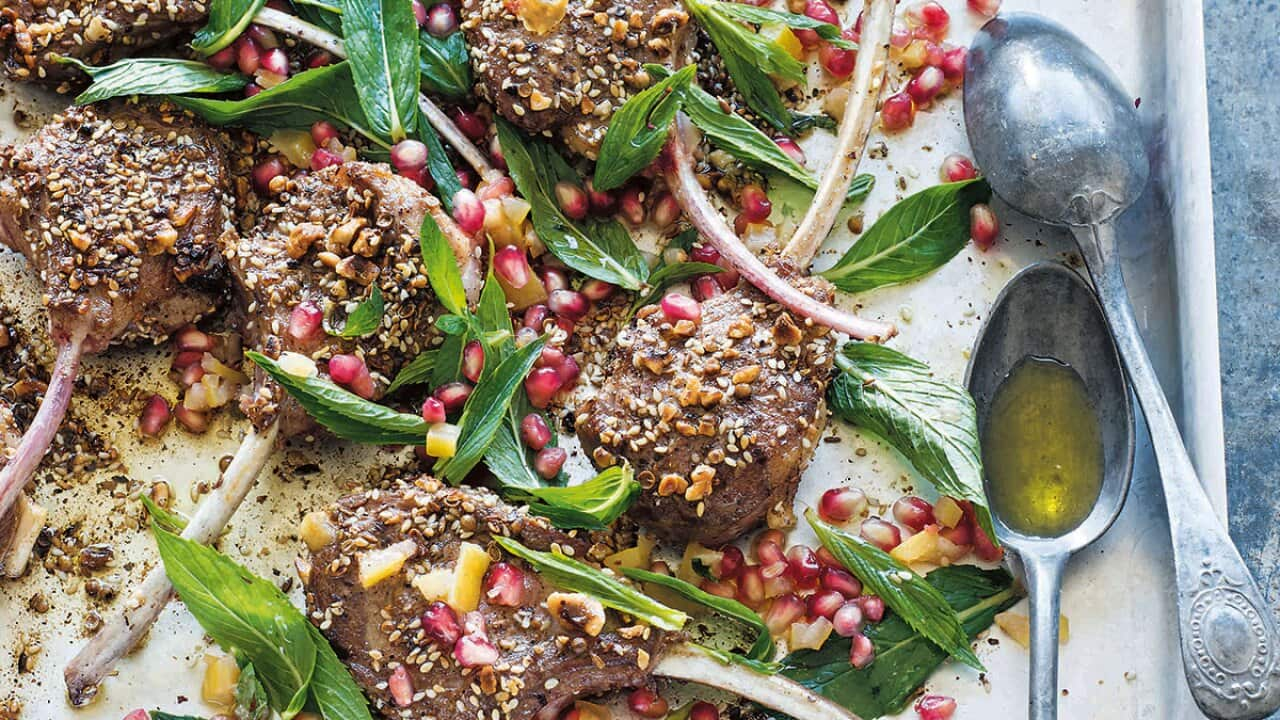Mombar is a rice-stuffed sausage popular on appetiser menus in restaurants and a favourite at family gatherings throughout Egypt.
Nick Nicola, the owner of the restaurant Mizraim in Camberwell, Melbourne, recalls his earliest memory of mombar as a celebratory food at his Christian Egyptian family home.
"My mum spent a couple of days cleaning and preparing the casing," says Nicola.
His father would slaughter livestock to celebrate momentous milestones such as a graduation in the family. Nicola remembers a passionate rivalry between his mother and aunt over what constituted the correct recipe for the filling. His aunt won. To this day, just like her, he doesn't add fresh herbs to his filling.
Preparing the dish is a labour of love. The intestines of cows or sheep are thoroughly cleaned, turned inside out, rinsed, soaked in a vinegar solution and brined. Nicola's recipe is special, he adds a little bit of beef mince and fat to a filling of rice, minced onion, garlic, green capsicum, and chilli pepper. "My secret is, I take a ring and slip it onto the intestine," reveals Nicola, as he explains the daunting process of keeping the intestine open to fill it with rice. It's then boiled and gets its distinctive golden colour during the final step: frying it to firm up the casing. This transformation to a rice-filled sausage achieves a satisfying crisp, spicy and savoury trifecta.
"My secret is, I take a ring and slip it onto the intestine," reveals Nicola, as he explains the daunting process of keeping the intestine open to fill it with rice. It's then boiled and gets its distinctive golden colour during the final step: frying it to firm up the casing. This transformation to a rice-filled sausage achieves a satisfying crisp, spicy and savoury trifecta.

Nick Nicola prepares mombar. [Credit: Eman Eldeeb] Source: Supplied
MORE PRIZED EGYPTIAN FOOD

This street food is vegan, delicious and Egypt's national dish
With 70 per cent of the Egyptian population Muslim, it comes as no surprise this dish is rather popular during Eid Al-Adha ('Festival of the sacrifice'; the second of two Islamic holidays) that features the often forgotten parts of livestock. Offal, the hidden treasure of the festival, is on the table of millions of Egyptians every year. Whether the animal slaughtered is a cow or sheep, to honour the sacrifice, no bit of the animal is wasted. The liver, kidneys, lungs, feet, tongue and even the brain are also stars of their culinary endeavours.
Mombar's power, however, is how it symbolises true love for Egyptian culture. Like any good relationship, the payoff here is worth the time and effort.
The scarcity of mombar here has intensified Egyptians' longing for it.
An intestine is deemed as an organ with a rather awkward past. Despite that, mombar beats the odds to be loved wholeheartedly in Egypt. Nick believes its popularity also has much to do with it being somewhere between a meat-based and a rice-based dish. "It's like eating meat without actually eating meat. [Egyptians] fill everything with rice. Grapevine leaves, eggplant, and duck. What would we do with the intestines except fill them with rice?" he joked.
When deciding on his special menu, Nicola wants to offer the dishes he knows Egyptians love. He has even received calls from Sydneysiders asking if he can post them orders. "The scarcity of mombar here has intensified Egyptians' longing for it." Due to the low demand and involved cleaning process such as disinfecting the intestines, butchers don't always keep it on hand.
Due to the low demand and involved cleaning process such as disinfecting the intestines, butchers don't always keep it on hand.

Mombar is not easy to make but it's worth it. [Credit: Eman Eldeeb] Source: Supplied
"I went to speak to a customer after he was served mombar, and he told me he'd burned his tongue in his haste to taste the dish he'd missed so much," Nicola says of the golden sausage's popularity since Mizraim opened.
It's a testament to an Egyptian commitment to loving even the unlovable, regardless of what it takes.
Love the story? Follow the author here: Instagram @





